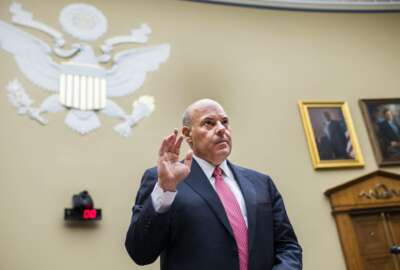

The Postal Service, in the hours leading up to polls closing, will sweep 220 mail-processing facilities for any remaining undelivered ballots in a dozen of its...
The Postal Service, in the hours leading up to polls closing, will sweep 220 mail-processing facilities for any remaining undelivered ballots in a dozen of its districts, following an order from a federal court judge Tuesday.
The order from D.C. District Court Judge Emmet Sullivan, in two lawsuits led by Vote Forward, NAACP Legal Defense Fund and Public Citizen, gave officials with the Postal Inspection Service and the USPS Office of Inspector General less than three hours to conduct the sweep, and required USPS to report by 4:30 p.m. that no ballots were left behind.
The order stems in part from USPS data showing about 300,000 ballots scanned into its mail processing plants didn’t receive an exit scan indicating that they went out for delivery.
Justice Department attorneys representing USPS, however, have warned that this data, while required by federal judges, doesn’t provide the full picture of its performance during the election. The agency, for example, has arranged for “local turnaround” in some areas, in which ballots received expedited delivery to local election boards and didn’t get scanned out.
“Even for ballots that enter the processing operations, many receive a special sort to expedite delivery, and thereby do not receive a last processing scan that would allow them to be captured by the performance scores,” attorneys wrote.
Those attorneys told the judge that sweeps conducted by USPS personnel remain ongoing, under the supervision of USPIS and OIG personnel.
USPS management originally planned to sweep facilities between 4-8 p.m. tonight, but were unable to accelerate this review “without significantly disrupting preexisting activities on the day of the election.”
“Defendants are working as expeditiously as possible to comply with this court’s orders while recognizing physical and operational limitations and the need to avoid disrupting key activities on Election Day,” the attorneys wrote.
Sullivan has allowed the sweep to continue beyond the time that he outlined in his order, but will hold a status conference on the case on Wednesday, where defendants “shall be prepared to discuss the apparent lack of compliance with the Court’s order.”
Postal inspectors have been observing operations and the security of election mail at all processing facilities that handle ballots since Oct. 29.
Processing centers have been under scrutiny in the lead-up to the election not only from the courts, but from agency watchdogs. In an audit of seven processing and distribution centers during the primary election season, the inspector general found that only one site completed a self-audit checklist meant to verify its readiness to receive and process election mail.
From Oct. 10-16, USPS delivered more than 95% of incoming ballots on time, and delivered ballots on-time at rates above 90% every day since Oct. 24 — except for Monday, when it delivered 89% of ballots on time.
The court-ordered sweep impacts several key battleground states in the presidential election, including the following regions.
USPS in lawsuit filings said the COVID-19 pandemic and employee shortages have caused some of the service declines in some of its underperforming facilities, but has relocated employees from other plants to mitigate the problem. USPS has also maximized overtime and hired new employees to deal with workforce shortages.
USPS documents in another federal lawsuit show that facilities in Detroit, Central Pennsylvania and Colorado have less than 85% of their employees available to report to work.
The Postal Service is at the center of a dozen federal lawsuits challenging many of the operational challenges implemented by Postmaster General Louis DeJoy this summer. Rulings and preliminary injunctions in more than half those lawsuits have blocked nearly all these changes from going into effect.
These rulings have also required USPS to submit daily performance metrics on late and extra mail trips between mail processing facilities and post offices, as well as on-time delivery of first-class and marketing mail.
Copyright © 2025 Federal News Network. All rights reserved. This website is not intended for users located within the European Economic Area.
Jory Heckman is a reporter at Federal News Network covering U.S. Postal Service, IRS, big data and technology issues.
Follow @jheckmanWFED


